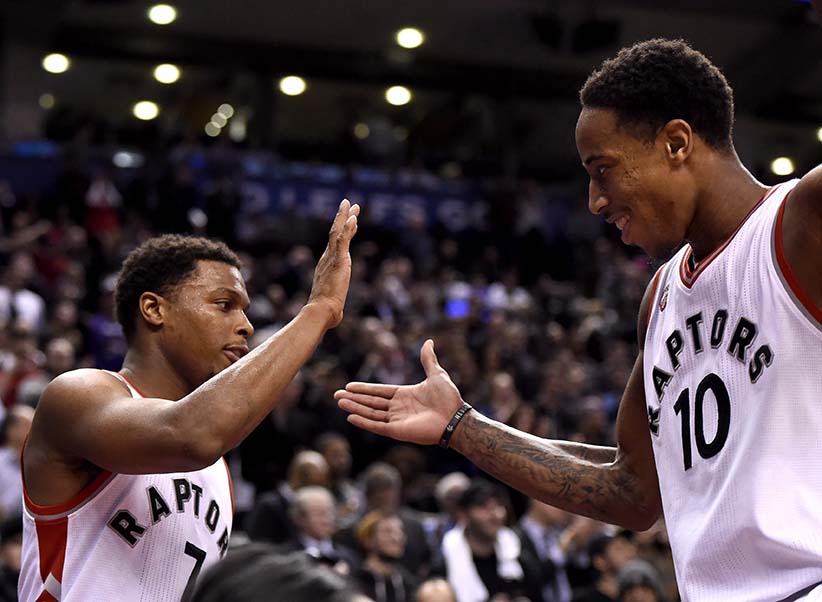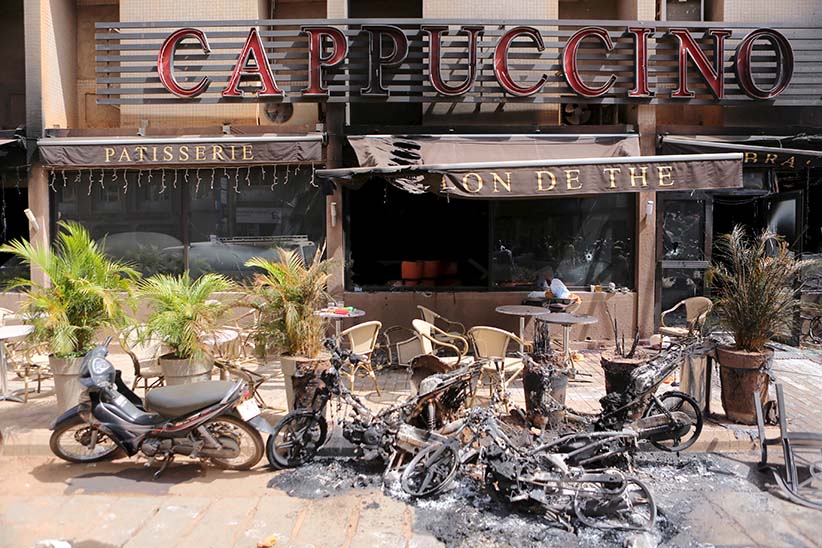Talking points: Of France frustrations and snatched crustaceans
Speed read the news with our Talking Points round-up, and sound like the smartest person in the room
Toronto Raptors’ DeMar DeRozan (10) and Kyle Lowry celebrate the dying seconds of their winning game against the Brooklyn Nets following second half NBA basketball action, in Toronto, on Monday, Jan. 18, 2016. (Frank Gunn/CP)
Share

Need an answer for that? Trying to look like the smartest person at the dinner party? Our Talking Points have you covered. Read our short takes on some of the big stories from the week that was:
1. For economic growth, go west—all the way west.
A recent Conference Board of Canada report predicts B.C.’s economy will “lead the country by a wide margin” in the near future, with growth of about three per cent through 2017. The latest numbers from Statistics Canada show the long-moribund lumber industry starting to rebound as U.S. home construction accelerates. Tough times in other regions are nothing to celebrate, but B.C. has quietly endured its own economic headwinds—especially outside the Lower Mainland. It was due for a turnaround.
2. What’s a few missiles between friends?
A prisoner exchange and the lifting of sanctions against Iran offer more signs that the decades-old enmity between Washington and Tehran has begun to thaw in earnest. Iran has lived up to its promise to limit use of nuclear technology to peaceful purposes—UN inspectors confirm it. While a dispute over Iran’s decision to test missiles remains, the two governments are in position to discuss the issue rather than trade threats. This moment could, as Iranian President Hassan Rouhani says, go down in history as the turning of a “golden page.”
3. There’s a gender gap on our currency.
There isn’t a Canadian woman on our currency, and Finance Minister Bill Morneau is right when he says it’s time we corrected the oversight. An added benefit: the illuminating historical argument that will ensue over potential candidates, which must necessarily go beyond the default cast of dead prime ministers. A working shortlist might include Bertha Wilson, the former chief justice of Supreme Court; Agnes Macphail, our first female MP; and the painter Emily Carr. All helped define the country. All long ago earned an honour we’re only now considering.
4. Is 2016 the year of the self-driving car?
The White House unveiled a plan this week to spend nearly $4 billion to accelerate the development of autonomous vehicles. In Canada, Ontario has cleared the way for the cars to be tested on the province’s roads, while the city of Stratford has volunteered to be a “petri-dish” community for the technology. These iniatives are key, because proponents of the concept have a sales job to do when it comes to reliability and safety. A new, in-depth survey suggests autonomous cars are more likely to inspire feelings of “powerlessness” and “anxiousness” in Canadians than “relaxation” and “freedom.”

5. Move over, Greece. There’s a new economic crisis in Europe.
The real basket case of Europe is the one with truffles in it. French President François Hollande—who hopes to win re-election next year—declared Monday that his country was in “a state of economic and social emergency” and announced a $2.2-billion plan to revive employment. But where is he going to get the money? France is hurtling toward a 100 per cent debt-to-GDP ratio and recently cast aside EU deficit limits to jack up military spending in the wake of the Paris attacks. Hollande’s claim he can find the savings elsewhere in the budget seems as credible as his previous promise to solve France’s fiscal woes by taxing millionaires.
6. The end of sunny days, in at least one respect.
Remember when Justin Trudeau declared his party’s respect for journalists? That was the campaign, silly. Now in power, the Trudeau Liberals block-booked a posh New Brunswick resort hotel for this week’s cabinet retreat, dispatching reporters to two other hotels in town so the PM and his ministers could mingle free of camera lights and pesky scribes. Déjà vu all over again.
7. The tennis world explodes with allegations of a racquet racket.
Different sport, same old corruption allegations. The target this time is professional tennis, reeling from a media report that some top players may be guilty of match fixing—and that senior tour officials turned a blind eye. According to the report, a core group of 16 (unnamed) players, including some ranked in the top 50, “have repeatedly been reported for losing games when highly suspicious bets have been placed against them.” Although the Association of Tennis Professionals says it “absolutely rejects” any suggestion it’s not doing enough to catch cheaters, the report rings true. Even Novak Djokovic, the sport’s top male player, says he rebuffed a cash offer to lose a match on purpose.
8. Here’s a crime that’s a tough one to crack.
Forty-eight crates of live lobster were stolen from an outdoor pound on Cape Sable Island on the southwestern tip of Nova Scotia, just a month after 14 crates of the delectable crustaceans were nicked in Yarmouth County. Each crate contained 100 lb., or 45 kg, of lobster, and at $6.25 per pound, the product lost from both heists was worth about $40,000. RCMP don’t know whether the thefts are related, and are looking for the culprits. But lobster is a hard item to fence, so the Mounties should start with anyone seen buying large quantities of butter.